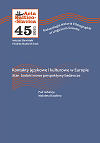The Paradigm of Finnish Reviews of Without Dogma by Henryk Sienkiewicz: Observations on the Issue of Intercultural Communication and the Functioning of Common Motifs of European Culture
The Paradigm of Finnish Reviews of Without Dogma by Henryk Sienkiewicz: Observations on the Issue of Intercultural Communication and the Functioning of Common Motifs of European Culture
Author(s): Krzysztof StępnikSubject(s): Media studies, Cultural Anthropology / Ethnology, Pre-WW I & WW I (1900 -1919)
Published by: Instytut Slawistyki Polskiej Akademii Nauk
Keywords: Henryk Sienkiewicz; "Without Dogma" ("Anielka"); reviews; Finnish press 1913–1914; intercultural communication;
Summary/Abstract: The translation of Henryk Sienkiewicz’s novel Without Dogma into Finnish, entitled Anielka (1913), generated considerable interest in the Finnish press, evidenced by as many as twelve reviews of the work. The article analyses these reviews, describes them in terms of a paradigm and presents their functioning on the book market. Taking into account cultural distance between Poles and Finns, the reviews are approached as a testimony to intercultural communication, which was enabled thanks to community – the paradigm of European culture and its common motifs, such as the mal du siècle or l’improductivite slave, the latter highlighted by Sienkiewicz and particularly interesting for Finnish reviewers. Cultural distance turns out to be a factor that reveals new aspects of interpretation of Without Dogma and, more broadly, the specificity of Finnish thinking about Poland.
Journal: Acta Baltico Slavica
- Issue Year: 2021
- Issue No: 45
- Page Range: 1-23
- Page Count: 23
- Language: English

